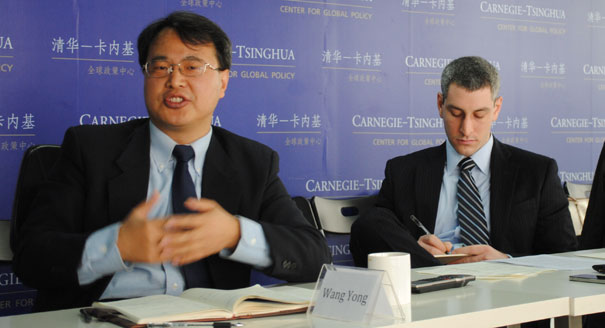Registration
You will receive an email confirming your registration.
The wave of leadership transitions in China and throughout the rest of northeast Asia has raised numerous questions about the region’s stability and the state of U.S.-China relations. Meanwhile, across the Pacific, U.S. President Barack Obama has tapped a new team for his second term cabinet. The implications of these leadership changes on the critical U.S.-China bilateral relationship are complex and still remain unknown.
The Carnegie-Tsinghua Center for Global Policy hosted a video conference with a panel of students and scholars from Georgetown University and Chinese scholars in Beijing to discuss the trajectory of these changes. The video conference featured Michael Green, the senior vice president for Asia at the Center for Strategic and International Studies, and Wang Yong, an associate professor at Peking University. The event was part of Carnegie-Tsinghua’s U.S.-China Trust Initiative, which aims to develop greater trust between the United States and China through constructive dialogue. Carnegie-Tsinghua’s Jim Lechleitner moderated.
Continuity and Change as Asia’s Leadership Transitions
- Unknown Impact: Green explained that international relations theory has largely ignored the impact of leadership transitions. He highlighted the fact that recently appointed leaders of China, North Korea, South Korea, and Japan are all children of former leaders. Thus, Green added, closer attention should be paid to any correlation between their leadership experiences and styles.
- Different Policymaking Styles: Green described how the United States usually conducts its foreign policy making through alliance networks and presidential and congressional exchanges. In China, decision making is concentrated at the top levels.
The Road Ahead for China and the United States
- Engage and Balance: Wang stated that China’s commitment to market reforms and deepened integration of regional economies will positively affect U.S.-China relations. Green added that the United States has contributed immensely to China’s rise in the global economy. Thus, both sides have a stake in the success of the other country. He added that hedging against one another is inevitable as the United States remains concerned with the balance of power in Asia.
- Lessons from Obama’s First Term: Green argued that Obama’s top-down approach in building strategic trust with China was not effective. He added that Obama’s overcompensation for the lack of bilateral trust has caused China to believe that the United States has no interest in previously contentious areas like Taiwan and Xinjiang. Green concluded that strategic trust cannot be based on bargaining, but should be built one step at a time.
Areas for Cooperation and Potential Contention
While the Korean peninsula has been a historical source of strategic competition, Green and Wang agreed that it may well present an area for cooperation between the United States and China. The outlook for cooperation on cybersecurity, however, does not look as favorable, they added.
- North Korean Crisis: Green stated that Kim Jong Un does have to consolidate domestic rule and ensure that the United States takes him seriously. However, the main concern for the United States and China is the recent military escalation on the Korean Peninsula. Green explained that the escalation is intended to increase North Korea’s leverage over the other regional powers. However, he added that Jong Un’s lack of experience may only increase the risk in an already unstable situation.
- Prospects for a Unified Korea: Green stressed that the United States does not have an active policy for regime change in North Korea. He added that if the regime change did happen, the greatest pressure would be on Seoul to manage the process.
- Cybersecurity: This is the issue that corrodes trust between China and the United States the most, said Green. He noted that the American Chamber of Commerce and U.S. Congress agree that Chinese cyber espionage is supported by the highest levels of Chinese government, but that victims of these cyber attacks will push the administration to pursue the issue more aggressively with China. Wang stated that the dominant presence of the United States in the cyber system distresses China, which calls for authority over the internet to be ceded to an international body.
Proposals for Greater Trust
- More Realistic Assessment: Wang argued that China’s leverage over the Asia-Pacific region has been overstated, and that the United States continues to exert a dominant role. He also proposed for a new agreement on calculating and conducting trade. He pointed out that Chinese companies earn a small percent of the profits from U.S. brands that outsource their manufacturing to China, while the trade imbalance remains widely unpopular in the United States.
- Greater Understanding on Common Interests: Wang also suggested that efforts should be directed at exposing the complementary nature of the U.S.-China relationship. Green argued that transition states such as Afghanistan, Myanmar, Sri Lanka, and Nepal can also be areas of cooperation between the two powers, since although these countries are perceived to be allied with China or the United States, both countries have interests in these countries emerging as stable regional players. Furthermore, these countries welcome U.S.-China cooperation on many issues.
- Role of Student Exchanges: A participant in Washington said that the long-term impact of student exchanges on U.S.-China trust should not be overlooked. Green and Wang agreed that student exchanges are necessary for trust and contribute significantly to recognizing shared values and interests.
